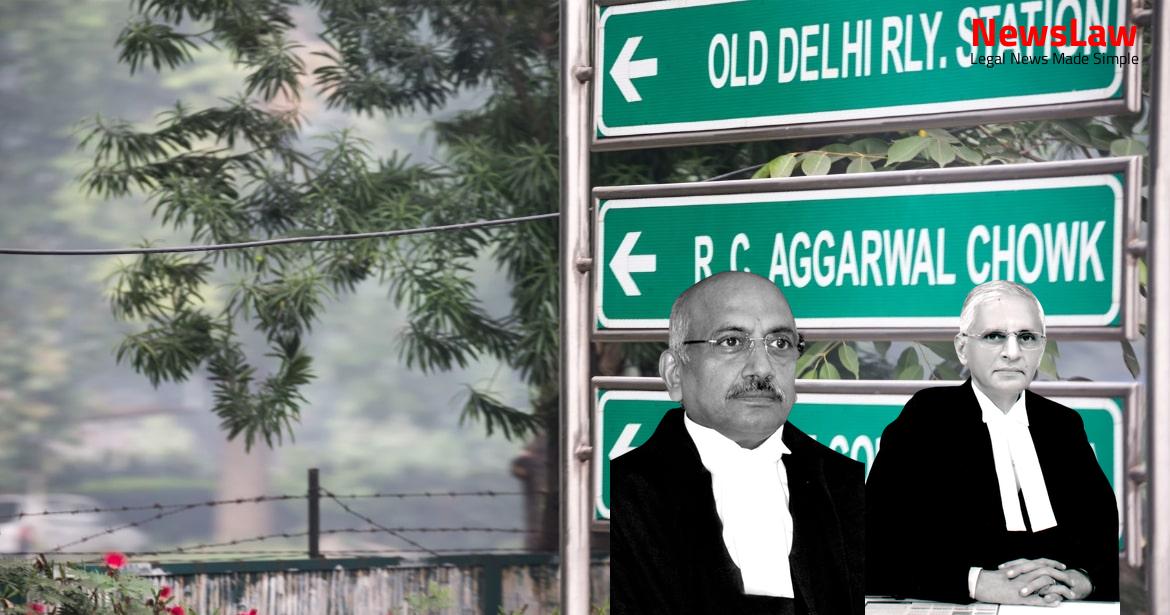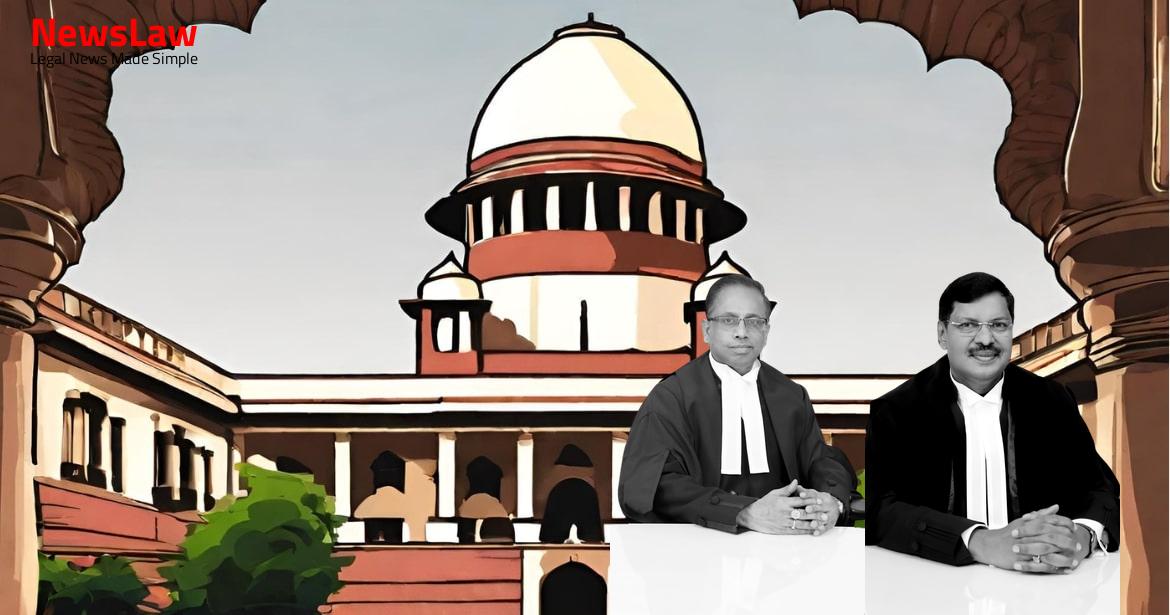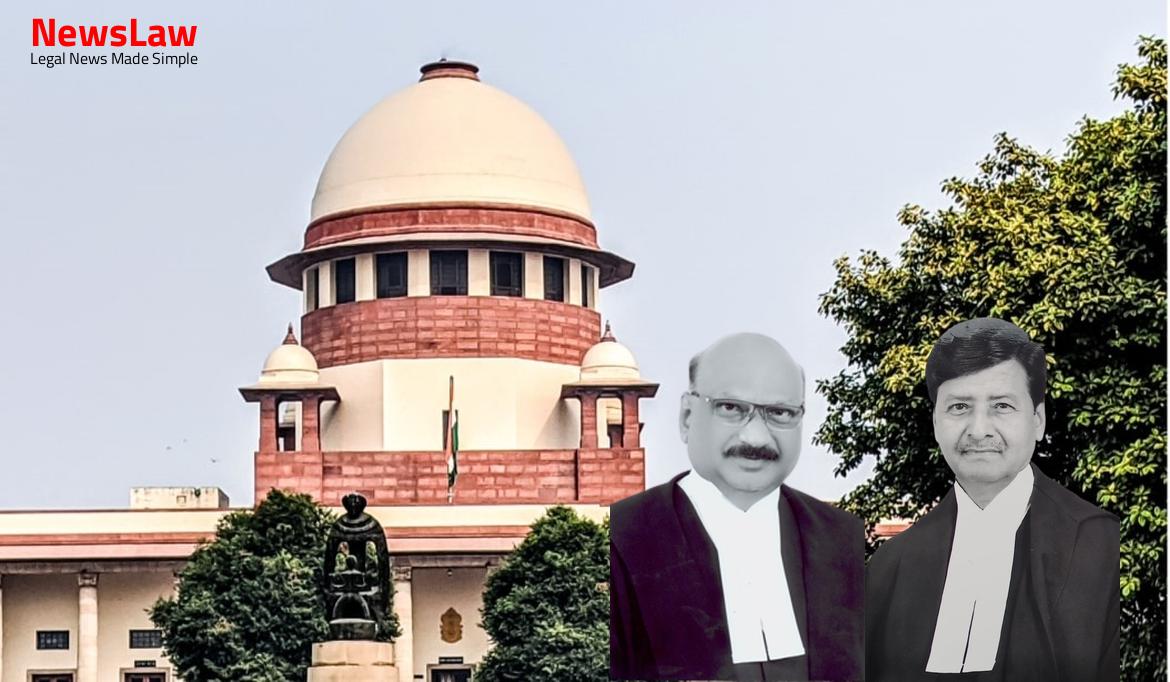In a significant legal development, the Supreme Court has delivered a judgment on the allotment of alternative housing sites in a land acquisition case. The case involves concerns raised by individuals facing displacement due to the acquisition of their lands. Find out more about the ruling and its implications for housing rights in the country.
Facts
- The lands in question were acquired for the Mass Rapid Transit System and handed over to the Metropolitan Transport Project (Railways) under the Government of India for their railway scheme.
- The acquisition of the land measured in S.No. 300/12 was done in accordance with the Land Acquisition Act and was not arbitrary or illegal.
- The High Court ordered that instead of the Housing Board, the Government would pass appropriate orders in accordance with the law.
- The petitioners are entitled to an alternate site under the Special Category of displaced persons due to the acquisition of their lands for the Railways.
- The land was already taken over by the Land Acquisition Officer and handed over to the Metropolitan Transport Project (Railways) for the Mass Rapid Transit System scheme after observing all statutory provisions and court orders.
- Despite several representations and petitions for reconsideration, the possession of the land was forcibly taken from the petitioners without going through acquisition proceedings.
- The acquisition proceedings were challenged by the private respondents in the High Court but were unsuccessful.
- The subject property was made over to the appropriate authority for the implementation of the Railway Project after the acquisition proceedings and possession were completed.
- State Government appeals against the judgment regarding land acquisition for MRTS Project (Railways).
- State Government claims lands were acquired lawfully and possession was taken after due process.
- High Court rejected the challenge and noted appropriate authority of State Government should have the lands.
- High Court’s order dated 12 December, 2003 supported the decision in favor of State Government.
Also Read: Balancing Justice: Case Summary of C.P. No. 16/2017
Arguments
- The High Court directed the State Government to provide an alternative housing site to the private respondent(s) in relation to acquired lands based on an erroneous assumption.
- The direction was considered an extra-legal concession without any legal obligation under the 1894 Act or project policies.
- The appellant argued that private respondent(s) had no legal right to an alternative housing site in this scenario, citing relevant Supreme Court decisions.
- The appellant also distinguished the reported judgments referred to by the High Court as not applicable to the present case.
- The learned counsel for the respondents argues that many of the persons from whom lands have been acquired are also individuals without houses or shop sites.
- The concern raised is that if these individuals are removed from their land, they would face significant prejudice.
- The argument highlights the potential harm and vulnerability of those who would be displaced due to land acquisition.
Also Read: Redefining Pre-Deposit Requirements: Ideal Detonators Pvt. Ltd. v. Commercial Tax Officer
Analysis
- The contention that the State Government could be directed to allot lands from any housing scheme in the city was rejected and the writ petitions filed by the private respondents were dismissed.
- The direction in the mentioned decision was about land owners becoming landless due to acquisition and applying for alternative land, with priority in allotment if conditions were met and land was available.
- The relief granted in previous cases was based on existing policies of offering alternative housing sites to affected landowners.
- The present applications by the petitioners deserve further consideration for housing site rehabilitation by the State.
- The argument of the private respondents that their claims must adhere to relevant policies existing at the time of the High Court’s direction in 2006 was deemed unnecessary.
- Schemes applicable to the acquisition for housing development were found to be inapplicable to the project for which the lands were acquired by the Railways.
- The decision in Bharat Singh vs. State of Haryana regarding land acquisition for industrial purposes was found to have no relevance to the present case.
- The High Court order dated 12 December, 2003, which directed equivalent alternate sites under the special category of displaced persons, has attained finality and not been challenged.
- The reasoning behind allowing the writ petitions of the private respondents was based on the finality of the aforementioned order and the need to provide relief to those affected by the acquisition for residential accommodation purposes.
- No scheme was formulated for providing alternative housing sites to project-affected persons in relation to the railway project implemented by the Central Government.
- The High Court’s fallacy was in assuming that allocations of alternative housing sites made in other cases could be applied universally, without considering the discontinuation of the policy regarding grant of alternative housing sites by the State Government since 2011.
- The Court rejected the argument that acquisition without providing an alternative site infringed upon the right to life under Article 21, stating that the compensation under the Act of 1894 was adequate.
- It was suggested that Development Authorities throughout the country should follow a similar principle to that in the Delhi Development Act when acquiring land for development in urban areas.
- The direction for allotment of alternative housing sites was not peremptory and hinged on existing State policy and discretionary powers available at the time of acquisition.
- The State Government’s discretion in providing alternative housing sites stemmed from its obligation towards the project under consideration and existing State policy at the time.
- The doctrine of public trust disables the State from giving back acquired property for less than market value if it cannot be used for any other public purpose.
- High Court cannot direct State Govt. and Housing Board to provide alternative land as displaced persons without a scheme in place.
- The principle from New Reviera Coop. Housing Society case states that providing alternative site cannot be a condition in all cases of land acquisition.
- Once land is acquired and vests in the State, the owner’s concern ends, and the State can dispose of unutilized land through public auction for public benefit.
- Landowners are entitled to compensation unless they challenge the acquisition proceeding, as seen in V. Chandrasekaran case.
- In State of Kerala case, the claim of landowners for return of unused acquired land for national highway construction was rejected.
- Authorities must ensure that persons living or conducting business on the land have the opportunity to obtain accommodation on land belonging to the Authority or local authority if they desire and comply with development and use requirements.
- Accommodation should meet reasonable requirements and terms should be settled with regard to the acquisition price of the land.
- If the Authority or local authority intends to sell undeveloped land, it must first offer it to the original owners with development and use requirements.
- Section 21(2) of the Delhi Development Act, 1957 outlines the powers of the Authority or local authority regarding land disposal.
Also Read: Interpreting Section 14 of the 2002 Act: Equivalence of CJM and CMM
Decision
- The writ petitions were dismissed as the miscellaneous petitions were closed.
- Directions were issued for the Secretary to Government, Housing and Urban Land Development Department to allot alternate land to the petitioners within eight weeks.
- The petitioners were directed to pay the cost of the land as fixed by the Tamil Nadu Housing Board.
- The writ petitions were allowed with the given directions, and all pending interim applications were disposed of.
- The impugned common judgment and order of the High Court were set aside.
- The private respondent(s) pursued representation before the State Government as directed.
- The representation was examined by the Government in consultation with the Tamil Nadu Housing Board.
- The State Government informed the petitioners that they were informed of procedural formalities during the land acquisition process.
- Petitioners were advised to apply to the State Government and Tamil Nadu Housing Board for allotment of house sites in housing projects promoted by the latter.
- The request of petitioners for allotment of lands as displaced persons by land acquisition for railways shall be considered based on the Supreme Court ruling in Lakhjit Singh Vs. State of Punjab.
- The above miscellaneous petitions were ordered accordingly.
Case Title: THE STATE OF TAMIL NADU Vs. DR. VASANTHI VEERASEKARAN
Case Number: C.A. No.-008626-008626 / 2009



